Memoirs
& Diaries: Zeebrugge
Updated - Tuesday, 18 December, 2001
by
W. Wainwright
The early days of February
1918 found me a minute cog in the machinery of the greatest Armada known,
the Grand Fleet - a seaman on board the Superb, stationed in the melancholy
regions of Scapa Flow.
One evening, in the midst of our usual festivities, namely, looking mournful
at each other, Nemesis in the shape of a large overfed "crusher" (ship's
police) overtook me, and I was informed that a large piece of "Gold Braid"
living an exclusive life at the far end of the ship had become interested in
me, and would I favour him with an interview?
I followed the pompous "body-snatcher", along brightly lit passages, feeling
dismayed, but on reaching the Commander's cabin all fears were dispelled, as
I was cordially invited to enter and found myself in a circle consisting of
the Commander, Secretary, Master-at-Arms, and five able seamen, all wearing
a vacant expression.
With my arrival a full quota appeared to be made up, as the Commander,
rising to his feet and producing a paper, informed us that the
Commander-in-Chief had sent him a signal for six seamen, for special
service.
He went on to say that, not knowing himself what the stunt was, he could not
give the least idea, except that it was dangerous work, and nine out of ten
chances that we should "snuff it", and we should be under twenty-three,
single, physically fit, and able to use a revolver and oar.
 From these conditions it appeared to us as though the result of the War
rested on us, and, needless to recount, oil was poured on troubled waters
with phrases of honour and glory.
From these conditions it appeared to us as though the result of the War
rested on us, and, needless to recount, oil was poured on troubled waters
with phrases of honour and glory.
fter letting his words sink in he gazed
at the condemned "six" and stated that if any did not want to volunteer
nothing would be said, and the man could just carry on.
However, no one moved, and no doubt, thinking I looked the silliest pigeon
there, the Commander asked if I would go. Having served a miserable six
months in that ship, and my third year in that dismal theatre of war, I
informed him promptly that I would be glad of it.
To get away from his tender care had been a cherished ambition of mine.
Needless to say, the remaining five jumped at the idea, and we were beamed
on with pride, solemnly shaken by the hand, and called heroes, and bidden to
depart to our habitation and say nothing, but by that time all the ship was
seething with excitement as to what was going to happen, and we found
ourselves the centre of an admiring crowd all agog with excitement.
I never knew I was so popular; even old sailors of twenty-one and abouts who
had hitherto passed me by with disdain (I was only nineteen), gave me
fatherly advice. I retired happy.
The glamour had not worn off the next morning, and vainly I tried to
concentrate on the day's work, that bugbear of civilization known as
"Saturday's routine", a mix-up of salt water, sand, and scrubbers, and I was
wandering round in a state of oblivion when an autocratic personage in the
shape of the Captain's Messenger came with the startling news that the "old
man" had expressed a desire to see us immediately.
My scrubber was dropped and I was on my way to his cabin before he had
finished his message.
Here, again, we were royally received with more handshakes and words of
praise, and our tender young ears must have burnt, but by far the best news
was that we would work no more in that ship, but confine our energy to
physical training and revolver exercise.
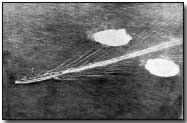 Monday morning saw us step off in a fine style, in athletical garb, led by a
high-stepping physical training instructor and watched by an admiring,
envious and cynical crowd, and we were kept at it all the afternoon, our
only respite being the ju-jitsu lesson, and later we landed for revolver
practice, wandering round on a deserted island and practising drawing and
shooting. I think it was a good job at first that the island was deserted.
Monday morning saw us step off in a fine style, in athletical garb, led by a
high-stepping physical training instructor and watched by an admiring,
envious and cynical crowd, and we were kept at it all the afternoon, our
only respite being the ju-jitsu lesson, and later we landed for revolver
practice, wandering round on a deserted island and practising drawing and
shooting. I think it was a good job at first that the island was deserted.
As the days went on we grew into whalebone and whipcord, thanks to the
slave-driver who had us in his care, and we understood the whys and
wherefores of revolvers and the art of firing, the days passing all too
quickly.
Again it was a Friday and we were beginning to think the affair was a
fiasco, when the bombshell burst, and our instructions were to the effect
that we were to leave the ship at 5 a.m. the following day and report on
board H.M.S. Hindustan at Chatham the following Friday, thus giving us a few
days' leave to say farewell to all relatives and any other affair before
being killed.
That journey south appeared the longest I had ever done. In fact, it took
thirty-six hours before I arrived at the home station, but all was forgotten
in the reunions, which might have been for me, as they were for many, the
last.
But, like all good things, they soon came to an end and I took my leave of
all with an uneasy feeling, wondering if I should ever come back. But at
nineteen cares are light, and I slept soundly in the train that was taking
me to this new adventure.
Holborn Station presented a curious spectacle the following morning; groups
of seamen could be seen talking with suppressed excitement and looking
questioningly at any seaman wearing the ribbon of some ship in the Grand
Fleet.
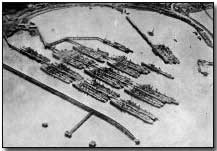 The Chatham train drew all these adventurers into its compartments, and here
the question, "Are you in this stunt and what is it going to be?" was freely
debated, but no one could throw any light on the subject, and whoever had
organized the whole business had preserved its secrecy in no uncertain
fashion.
The Chatham train drew all these adventurers into its compartments, and here
the question, "Are you in this stunt and what is it going to be?" was freely
debated, but no one could throw any light on the subject, and whoever had
organized the whole business had preserved its secrecy in no uncertain
fashion.
A couple of hours later brought us to Chatham, and, knowing the dinner that
would await us, we decided to join the ship with a good meal stowed away, so
dined in town before attempting the miserable walk to the dockyard.
Our knowledge stood us in good stead, as, once aboard the Hindustan, the
usual emergency dinner was served, bully beef, bread and pickles, but, for
once, "sailors didn't care", and the natural excitement and high spirits
took the edge off everybody's appetite.
The remainder of the afternoon was spent in recovering our belongings, which
had been dispatched from Thurso the week previous, and getting to know the
lay of the ship and making acquaintances.
In the evening a strong contingent made their way to the barrack canteen in
such a jovial mood that the clash that came with the men of the barracks
later was inevitable (it's a curious trait with a seaman, but he'd fight his
own brother just for the sake of being antagonistic if the brother belonged
to a different depot or fleet), and it was only after the guard had been
turned out and the dockyard police reinforced that peace was obtained.
During the next few days we were formed into companies, platoons, and
sections, introduced to our leaders and put through our paces on St. Mary's
Island both day and night, and then handed over to the instructors of the
5th and 6th Middlesex Regt. to be polished off and to be instructed in the
fine arts of land warfare.
The weeks that passed then were one mass of bayonet drill, pointing and
parrying, blob sticks, bombs, trench mortars, gas, night attacks, final
assaults, and musketry, and we were gradually becoming excellent soldiers.
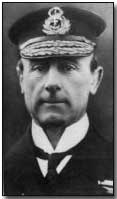 A slight change in the run of things found our section transferred into a
3-inch Stokes trench-mortar battery, and we were armed with a combination of
nautical weapons, the pistol and cutlass (the latter article is only useful
for deck cricket, when three of them make good wickets), and our training
regarding the wielding of this barbarous weapon began again.
A slight change in the run of things found our section transferred into a
3-inch Stokes trench-mortar battery, and we were armed with a combination of
nautical weapons, the pistol and cutlass (the latter article is only useful
for deck cricket, when three of them make good wickets), and our training
regarding the wielding of this barbarous weapon began again.
The whole of this period spent in training was glorious, the new
surroundings and atmosphere, the unfamiliar work and the keenness to become
proficient at it, and the high spirits between officers and men combined to
make the work a most pleasing task, and, although our leave was stopped, we
found ways and means of having a run ashore, a proceeding which was given
the blind eye by our officers.
The worst punishment a man could be threatened with was expulsion from the
party. "The Mecca" of our pilgrimage was gradually growing nearer, but we
were still in the dark regarding the actual intention of all this strenuous
training.
Our training was now nearing completion, and our massed attacks were taking
on a sameness which pointed at some concerted item we were rehearsing for,
and many inventions were tried, with a view to saving as many lives as
possible, and we had practically reached the acme of perfection and were in
danger of going stale.
One morning, about this period, our usual route was changed, and we found
ourselves inside the Royal Marine Barracks, and, after being thumped, patted
and pushed round by a rotund sergeant-major, we emerged into fresh air, in a
dazed state, and a suit of khaki.
There was another trial and tribulation put upon us, the difference between
our nautical garb and this warrior's suit being as wide as the Poles, and
the weather being warm for the time of the year, there was a distinct,
subdued and muffled up feeling amongst our detachment, but in a day or so
all strangeness wore away, and the mess-deck mirrors did a roaring trade.
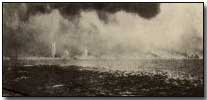 It had now reached the beginning of April and we had finally finished our
training with the Army, when we got the order to get "under way" and proceed
to a certain rendezvous, and accordingly the same evening found us in a
desolate waste of water known as the Swim just off Sheerness.
It had now reached the beginning of April and we had finally finished our
training with the Army, when we got the order to get "under way" and proceed
to a certain rendezvous, and accordingly the same evening found us in a
desolate waste of water known as the Swim just off Sheerness.
A couple more days aboard the Hindustan and orders were issued that we
should embark in that curious stranger that had just arrived, an obsolete
cruiser with a strange Noah's Ark look about her, the Vindictive, and we
were conveyed to her by the Liverpool ferry-boats Iris and Daffodil.
Our going aboard of her synchronized with the arrival of three detachments
of Marines, and the living accommodation was taxed to its utmost.
The ship itself was an exceedingly unique specimen of warship, there being
no comparison to her former days when she had been a pride to all who sailed
in her. She had been stripped bare of everything bar the essential parts,
her mainmast having gone and her foremast cut short above the fighting top.
Along her portside ran an immense wooden chafing band reinforced with huge
hazelwood fenders and on the port quarter a part of the main-mast had been
cemented to the deck to enable her to lay alongside any wall without
swinging out, head on stern.
Covering her port battery ran a false deck lined with sandbags, and towering
above this deck was an array of improvised gangways, sixteen in all, flanked
by two huge metal huts housing the foremost and aftermost flame throwers.
At the break of the fo'c'sle and the quarter-deck were two grapnels fitted
to wire pennants and leading respectively to the foremost and
after-capstans. Here fore and after guns had been replaced by 7.5 howitzers
and midships abaft the after funnel was an 11-inch howitzer, the port
battery had been replaced with 2-pound pom-poms, with the exception of the
foremost and after 6-inch gun, whilst two pom-poms adorned the fighting-top.
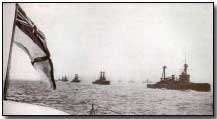 There is no denying it she was ugly, as she lay there, a veritable floating
fortress, a death-trap fitted with all the ingenious contrivances of war
that human brain could think of, but we took unholy pride and a fiendish
delight in her, and if it were possible for men to love a ship, we loved
her.
There is no denying it she was ugly, as she lay there, a veritable floating
fortress, a death-trap fitted with all the ingenious contrivances of war
that human brain could think of, but we took unholy pride and a fiendish
delight in her, and if it were possible for men to love a ship, we loved
her.
Now came the awakening: the platoons were gathered together under their
commanders, who, fortified with models and aerial photos, explained to us
our objective - we were to block the entrance of the Bruges canal at
Zeebrugge and Ostend and our objective was to land and obtain possession of
the Mole, to enable the blockships (Iphegenia, Intrepid, and
Thetis) to get
into position for sinking, and to cause a diversion to facilitate that
project.
The magnitude of the scheme overwhelmed us, the sheer audacity of tackling a
place like Zeebrugge under the muzzles of the world-famed Blankenberghe
Battery , where a change in the wind or tide at the critical moment would
undoubtedly result in the total loss of the expedition.
Viewing the whole outlook in cold daylight the large element of luck that
must accompany us for the scheme to be successful was evident, also the
knowledge that such an undertaking was impossible without a huge loss of
life, but the last thought lay the lightest, our chief worry being that the
stunt might end in hot air and all of us be sent back to the Fleet.
However, no time was wasted, for on April 11th we weighed anchor and
proceeded out to sea in company with other ships of the expedition.
Our send-off lacked nothing in heartiness as the crew of the Hindustan
cheered us on our way, and what with our responding cheers, the huge harbour
sounded for all the world like some cup-tie arena; the momentary sadness
that inevitably follows these partings (for your bluejacket is not totally
callous) soon gave way to the thoughts that we were at last on the way for
our objective.
The land left behind, our fleet took up some semblance of order, but proper
order among such a strange assortment of craft was impossible. In the centre
steamed the Vindictive with the Iris and Daffodil in tow, astern of these
came the Thetis, Intrepid, Iphegenia, Sirius, and
Brilliant, whilst
surrounding these disreputable looking ships were destroyers,
motor-launches, C.M.B.'s, and a sturdy little picket boat could be seen
towing a submarine, whilst far away monitors were taking up position to
cover the attack.
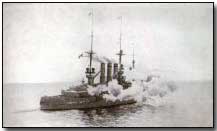 As the final hour approached, the finishing touches were put to a
well-organized ship, ammunition was fused and placed in readiness, hoses run
out and all preparations made prior to going into action.
As the final hour approached, the finishing touches were put to a
well-organized ship, ammunition was fused and placed in readiness, hoses run
out and all preparations made prior to going into action.
The night was dark, and far
away could be seen the British aircraft making a bombing attack on
Zeebrugge, and further still the dull red flashes of the artillery in
Flanders.
The ship slowed down and stopped whilst the heads of
departments conferred, until slowly the whole significance dawned on the
troops; the wind had changed and we could not carry out our plans, and it
was a disappointed ship that sailed for England that night.
The following day another attempt was made, but this again was unsuccessful,
as the wind, this time in the right direction, was too fresh and made it
impossible for the smaller craft to proceed, and these were needed to ensure
the success of the operation.
Another shift was our portion, for on account of the congestion of the
living accommodation, the battleship Dominion was sent out to act as an
overflow ship, and we duly found ourselves aboard her. The days were spent
now in keeping fit, but I think most of the time was spent in sleep and, on
the whole, we had a fairly easy time.
The time was approaching when, if the next attempt failed, the whole stunt
was likely to be postponed, as after this period the necessary flood tides
would not occur at the times required. April was nearing its end when we
embarked on the Vindictive again.
This was on the morning of Monday, April 22nd, and once all the troops were
assembled we lost no time in breaking our moorings, taking the Iris and
Daffodil in tow and proceeding to sea in the exact formation of the previous
attempts.
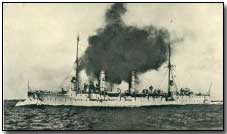 The trip across the Channel was uneventful and most of the time was passed
with impromptu concerts and dances and I doubt if any there thought of the
serious mission of this strangely assorted fleet. After supper had been
served, practically everybody snatched an hour or two's sleep before the
fateful zero hour; how anyone could sleep with an adventure like the one
before us speaks volumes for the mental and physical fitness of the party.
The trip across the Channel was uneventful and most of the time was passed
with impromptu concerts and dances and I doubt if any there thought of the
serious mission of this strangely assorted fleet. After supper had been
served, practically everybody snatched an hour or two's sleep before the
fateful zero hour; how anyone could sleep with an adventure like the one
before us speaks volumes for the mental and physical fitness of the party.
Our slumbers were disturbed by a bugle call, and a ration of hot
chicken-broth was served out, supplemented by a ration of grog, the latter
ration being left practically untouched, it being thought that a clear head
and steady eye were more beneficial.
Word was passed round then, and the men assembled at their stations for the
attack as leisurely as if going to a football-match.
A cheerless scene greeted one's arrival on the upper deck. It was a black
night, everything was wrapped in fog, while behind, the ships were
unnaturally quiet, the only sounds being those of the engine going slow, the
lap of the water against the ship's sides and the subdued murmur from the
bridge, with now and again the rattle of the helm; nothing could be seen.
Suddenly the quietness of the night was shattered by a single rifle-shot;
this was followed almost immediately by a dull red flash over the fo'c'sle
and the angry crack of a bursting shell, a few yells and an isolated call of
"Mother". The game was on, and Jerry had drawn first blood.
The wind had now changed and was blowing the smoke screen and artificial fog
back over us, leaving us the target for the shore batteries, but ahead of us
loomed the Mole, 200 yards away, and for this we raced.
Following the burst of the first shell the night had turned into day by
searchlights and star-shells, and all the venom and hatred of the shore
batteries seemed concentrated on us, salvo after salvo struck the ship,
doing indescribable damage in the packed starboard battery where all the
storming party were awaiting to land; the foremost howitzer's crew were
wiped out with the exception of the voice pipeman, who was a couple of yards
away.
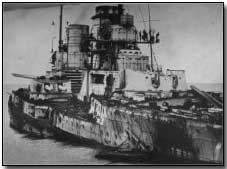 The strangest part of this was that the trench mortar battery, not more than
4 feet away, did not receive injury at that time.
The strangest part of this was that the trench mortar battery, not more than
4 feet away, did not receive injury at that time.
Within the space of a few
seconds the leading seaman in charge of our battery had been hit in the back
of the head, whilst half a dozen of our battery had received superficial
scratches.
We were now alongside the Mole and sheltered a little from the murderous
hail of shell from the forts, which continued to keep up a burst of shrapnel
around our funnels, which showed up and made excellent targets.
Every gun in
the Vindictive that could bear had now given tongue and the night was made
hideous by the nerve-racking shatter of the pom-poms, the deep bell-like
boom of the howitzers and trench mortars, and all-pervading rattle of
musketry and machine-gun fire; it was hell with a vengeance and it seemed
well-nigh miraculous that human beings could live in such an inferno.
Meanwhile, down on the quarter-deck the ship was being secured by means of
the large grappling irons fitted on wire pennants, which had continually
been thrown back from the wall by a few Germans whose bravery was eclipsed
by none, until they were driven off by rifle-fire.
After what seemed an eternity, the anchor rattled down and the all-fast
signal was given. Of our sixteen specially constructed gangways only two
remained, but these were already in position and up into the night went one
huge yell, all the pent-up feeling of the years of war and hatred and the
lust for killing, and the seamen's storming party landed, followed by the
Royal Marines.
To many, that yell was their last earthly sound, as the Germans kept up a
concentrated machine-gun fire on the gangways, and the dead and wounded were
piled up three or four deep, but the remnants of the platoon staggered
through, reorganized, and carried on as though still in the peaceful heart
of Kent.
To see these men, the cream of the youth of England, laughing, cheering, and
swearing, rushing into what seemed certain death, was not inspiring; it was
heart-breaking to think that in these enlightened days the youth of the
country was being butchered in the cause of civilization, and St. Peter must
have wiped his eye as he greeted most of them home.
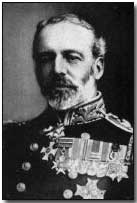 Once on the top of the Mole one was assailed by the overwhelming feeling of
nakedness and maddening desire to go forward at all costs and stop the hail
of death that swept the upper Mole; sense and reason were replaced by insane
fury and the events that followed cannot be remembered coherently; it was a
horrible nightmare of sweating and cursing men thirsty for blood, the
sickening "sog" of bayonets and of shots at close quarters.
Once on the top of the Mole one was assailed by the overwhelming feeling of
nakedness and maddening desire to go forward at all costs and stop the hail
of death that swept the upper Mole; sense and reason were replaced by insane
fury and the events that followed cannot be remembered coherently; it was a
horrible nightmare of sweating and cursing men thirsty for blood, the
sickening "sog" of bayonets and of shots at close quarters.
Of the individual deeds of heroism that were enacted that night there are
hundreds that never will be told, they are kept a jealously guarded secret
in the hearts of the survivors.
At last, through the din and uproar, rose the wailing of a siren, the signal
that the job had been done, telling the storming parties to retire and the
remnants of the platoons, by now sadly depleted, to fall back to the ship,
bringing wherever possible their wounded.
But what of the Vindictive? Whilst the landing-party was on the Mole, she
had been subjected to a galling bombardment of shrapnel, and her upper-deck
was a veritable shambles, while the superstructure presented a sorry
appearance.
Willing hands had ventured forth under heavy machine-gun fire and cleared
the wounded below and given help to the returning parties from the Mole.
After the safety limit of time had been reached in allowing the parties to
return orders were given to slip the cable, while the guns that were still
serviceable put up a barrage to prevent a counter-attack, and the wind, now
favourable, again carried down the artificial fog and blotted out the ship
from the shore batteries whilst we steamed all out for England and home.
W. Wainwright joined the
Royal Navy in 1915, at the age of 16, and served in H.M.S. Monarch (Grand
Fleet) in the North Sea, taking part in the Battle of Jutland. Was
drafted to H.M.S. Superb in 1917, and served in her until volunteering to
take part in raid against Zeebrugge (April 23rd, 1918).
Returning to depot was
sent to H.M.S. Gardenia, engaged on anti-submarine warfare and convoying
duties in the Irish Sea and North Atlantic, and later in the Mediterranean.
Was in Tripoli (Syria) when Armistice was signed and proceeded to
Constantinople with the occupying Fleet.
Engaged in 1919 in
operations against Russia, around the Crimea and Black Sea ports, and on
repatriation duties in Turkey-in-Asia.
In April 1920 left
H.M.S. Gardenia with the Engeli Expedition (a party of 31 men) in an attempt
to reach Engeli (North Persia) via Batoum and Baku, to reorganize the
volunteer Fleet on the Caspian Sea. The party arrived in Baku (Azerberzium)
the day that state turned Bolshevik, was surrounded by the 11th Red Army and
forced to surrender.
The whole party, along
with a few other Britishers, being confined first at the Checka and then in
cells in the Bieloff Prison, on the outskirts of Baku. Exchanged, in
November 1920, reaching England December 1920.
Served later in H.M.S.s
Bruce, Malaya, and Serapis, and was finally discharged in June 1928.
by Captain Alfred
Carpenter in a wartime interview with Lieutenant J. Keble Bell
Let me, first of all, try
to tell you the story of Zeebrugge as I extracted it, not without
difficulty, from several of the leading spirits of that enterprise.
This is no technical story.
Elsewhere you will find the official narrative issued by the Admiralty to
the Press, and that contains, as all good official documents do, names,
ranks, dates, times, and movements.
I lay claim to no such
precision. It is my proud yet humble task to bring you face to face,
if I can, with the men who went out to greet what they regarded as certain
death - bear that in mind - in order to stop, in some measure, the German
submarine menace, and to prove yet once again to all the world that the
British Navy is the same in spirit as it was in the days of Nelson and far
down the ages.
These men went out on the
eve of St. George's Day, 1918, to do those two things - the one utilitarian,
the other romantic. They went out to block the Bruges Canal at
Zeebrugge - to stop that mouth which for so long past has been vomiting
forth its submarines and its destroyers against our hospital ships, and our
merchant vessels, and the merchant vessels of countries not engaged in this
war.
 They
blocked it so neatly, so effectively, that it will be utterly useless as a
submarine base for - I long to tell you the opinion of the experts, but I
may not - many months to come.
They
blocked it so neatly, so effectively, that it will be utterly useless as a
submarine base for - I long to tell you the opinion of the experts, but I
may not - many months to come.
This shall be proved for
you as we proceed. Now let me explain, very briefly, the nature of the
task which the Navy set itself. You imagine Zeebrugge, perhaps, as a
long and dreary breakwater, flanked by flat and sparsely populated country,
with a few German coastguards dotted about, and a destroyer or two in the
offing.
I am certain that that is
the mental picture most of us had of Zeebrugge - if we had one at all.
Now conceive instead a
crowded fortress. Conceive a garrison of no less than one thousand men
ever on the break-water. Figure to yourself, at every possible coign
of vantage, guns of mighty calibre, destroyers lurking beneath the Mole on
the harbour side, searchlights at all points, and great land guns in the
distance ready to pulverize any hostile craft that dares to show its nose
within miles.
Picture all that as vividly
as you can, and then ask yourself the question: "Would it be possible to
storm Zeebrugge so successfully that block-ships could be sunk in the very
mouth of the Canal and seal it up?"
How would you have set
about it? With a huge force of cruisers? No, for the enemy must
be taken by surprise. The action must be swift, cunning, and sure.
The enemy must not be warned, or your one object, the blocking of the Canal,
will be lost.
 It
took Lord Jellicoe and Sir Roger Keyes six long and anxious months to
perfect their plan, with the chance that the secret, at any moment, might
slip out.
It
took Lord Jellicoe and Sir Roger Keyes six long and anxious months to
perfect their plan, with the chance that the secret, at any moment, might
slip out.
But it was perfect at last,
and the secret had not slipped out. Next they wanted a number of men -
picked men with special qualities - who would be ready and eager to die if
only this amazing coup might be achieved.
Last of all they wanted a
night on which all the conditions - the wind, the weather, the light -
should be in their favour. They did not get that, but they went in,
none the less, and did the job.
What would you say if you
heard, some fine morning, that an almost obsolete German cruiser had come
and leant up against the wall of Dover Harbor, that two German officers had
calmly sat astride the wall in the course of their business, that some
German sailors had landed on the wall and chased our gunners away from their
guns, and that, in the meantime, three quite obsolete German ships, filled
with concrete, had been sunk in the mouth of the harbour and blocked it?
What in the world would you say?
I think you would at first
refuse to believe it. Then, when some official communication lent
colour to the story, you would tear your hair, declare that all was lost,
and utter extremely unpleasant things about the British Forces and those in
charge of them.
Yet this is precisely what
happened at Zeebrugge. There is nothing more gallant in the annals of
the British Navy. Not one man expected to come back. There is
nothing more successful in the annals of the British Navy. They did to
the full just what they hoped and had planned to do.
 "Some
people," said Captain Carpenter, "have called this affair audacious.
That isn't the word I should use for it."
"Some
people," said Captain Carpenter, "have called this affair audacious.
That isn't the word I should use for it."
"What word would you use?"
"Impertinent," he replied,
laughingly. "Just imagine this Armada of smoke-boats, motor launches,
ferry-boats, obsolete submarines, and ancient cruisers laden with concrete,
headed by the old Vindictive, setting out in broad day-light to
attack the mighty fortress of Zeebrugge."
"In broad daylight!" I
exclaimed.
"Certainly. We timed
ourselves to reach the Mole by midnight, so, owing to our slow speed, we had
to do three hours of the oversea passage in daylight."
"How were the men?
Excited?"
"Oh, no; quite calm, and
immensely relieved to be at it at last. Well, so soon as it got dark,
it was dark! We could hardly see a thing, and when the smoke-boats got
to work, pouring out great waves of dense smoke at regular intervals, which
the light northeast wind carried right across the Mole and the harbour,
pitch doesn't describe it!"
"What about the
mine-field?"
"H'm! Anyway, we
dodged it. My job, you understand, was to get alongside the Mole, land
my Marines, help Iris and Daffodil to do the same, stay there
drawing the fire of the batteries and diverting attention while the
block-ships got into the Canal and sunk themselves, then get the Marines
back on board, shove off, and clear out as quickly as possible.
"Incidentally, of course,
we meant to put out of action as many Huns as was convenient by fire from
our guns. You've seen the picture of the fighting-top? That was
filled with Marines armed with Lewis guns. They did capital work.
I'll come to that later.
"We got pretty near the
Mole before they saw us, and then the fun began! Up went the
star-shells, the guns began blazing, and we went pell-mell for the old Mole
like that."
 A
savage dig at the model with his cane.
A
savage dig at the model with his cane.
"I had intended to fetch up
just here" - he indicated a spot on the exterior of the great wall pretty
near the head of it - "but actually came in here" - a little further inland.
"We'd had things called
'brows' constructed - a sort of light drawbridge with a hinge in the middle.
These were lowered away, but the current was so strong against the Mole, and
the Vindictive bounced up and down so nimbly, that the men had the
devil of a job to drop the ends of these brows on the wall.
"All this time, naturally
enough, the Huns were blazing at us with everything they'd got. If you
have a look at the Vindictive in the morning, you'll soon see what
they were doing to us. We were just swept with fire from two sides.
Even before the party could begin to land, Colonel Elliot and Captain
Halahan, poor chaps, who were in charge of that part of the business, were
killed.
"The Iris went ahead
of me and came alongside the Mole just here" - a little nearer the shore
end. "They tried to hang on with their grapnels, but couldn't quite
manage it, so Lieut.-Commander Bradford and Lieut. Hawkins scrambled ashore
and sat on the parapet, trying to fix the grapnels. They were both
killed.
"In the meantime, owing to
the difficulty of securing to the Mole when alongside, I ordered the
Daffodil to continue pushing, according to plan, so as to keep us in
position. This was a pity, because she was full of men, and they
couldn't land to help with the fighting. Eventually, some of them
scrambled across the Vindictive and landed that way.
"The wind had changed about
fifteen minutes before we came alongside the Mole; all the smoke had cleared
off and the harbour was plain to the eye. That helped the Huns to pot
at us, and they took fine advantage of it. The din, as you can guess,
was terrific, and I think they got the old Vindictive in every
visible spot.
 "Suddenly
the thing happened for which we had been, semi-consciously, waiting.
There was a tremendous roar, and up went a huge tower of flame and debris
and bodies into the black sky! My fellows cheered like mad, for they
knew what it meant. Sandford had got home beneath the viaduct with his
ancient submarine and touched her off. I never saw such a column of
flame! It seemed a mile high!
"Suddenly
the thing happened for which we had been, semi-consciously, waiting.
There was a tremendous roar, and up went a huge tower of flame and debris
and bodies into the black sky! My fellows cheered like mad, for they
knew what it meant. Sandford had got home beneath the viaduct with his
ancient submarine and touched her off. I never saw such a column of
flame! It seemed a mile high!
"I must tell you a curious
feature of this affair. As he approached the Mole they got the
searchlights on to him and began firing at him. That was a nasty
position, because she was stuffed full of explosives, and also had a big
quantity of petrol on board. But when they saw him still coming on,
and dashing straight at the Mole, they stopped firing and simply gaped.
I suppose they thought he was mad.
"Anyway, they paid for
their curiosity. On the viaduct itself there were a whole lot of Huns
- masses of them. There they stood, staring at Sandford in his
submarine. The searchlights lit them up. Then, presently, came
the explosion, and bang went the whole lot to glory! They must have
been the most surprised Huns since the war started.
 "All
this time, of course, a lot of other things were happening. Many of
the seamen and Marines had landed on the Mole and were making fine play with
the astonished Germans. Some went right to the head of the Mole and
found the guns deserted. One gun, I must tell you, had not even been
uncovered, which is clear proof that the garrison was taken by surprise.
Others were chasing the enemy all down the Mole towards the viaduct, which
they were never to cross, and some went into the shed I told you about and
dealt with such people as they found.
"All
this time, of course, a lot of other things were happening. Many of
the seamen and Marines had landed on the Mole and were making fine play with
the astonished Germans. Some went right to the head of the Mole and
found the guns deserted. One gun, I must tell you, had not even been
uncovered, which is clear proof that the garrison was taken by surprise.
Others were chasing the enemy all down the Mole towards the viaduct, which
they were never to cross, and some went into the shed I told you about and
dealt with such people as they found.
"The men in the
fighting-top were also doing fell work. All along the Mole, you see,
and close under the fifteen-foot parapet, there are dug-outs or funk-holes.
At first the Huns popped into these, but by-and-by it occurred to them that
they would certainly be found and spitted if they stayed there, so the
bright idea occurred to them of nipping across the Mole and dropping down
the side into their own destroyers lying there. An excellent scheme
but for our fellows in the fighting-top, who picked them off with their
Lewis guns as they ran.
"Those chaps in the
fighting-top had to pay for it, though, in the end. They were
attracting a lot of attention, and the Huns were constantly trying to drop a
shell amongst them. They succeeded at last, I'm sorry to say, and laid
out every man jack but one - Sergeant Finch. He was wounded badly, but
dragged himself out from under the bodies of his pals and went on working
his little gun until he couldn't work it any longer.
"Now we come to the
block-ships. We saw Thetis come steaming into the harbour in
grand style. She made straight for the opening to the Canal, and you
can imagine that she was a blaze of light and a target for every big thing
they could bring to bear. She was going toppingly, all the same, when
she had the rotten luck to catch her propeller in the defence-nets.
Even then, however, she did fine work. She signalled instructions to
the Intrepid and Iphigenia, and so they managed to avoid the
nets. It was a gorgeous piece of cooperation!
"And, by the way, I'm not
at all sure that Thetis won't give even more trouble to the enemy
than the other two. I told you something, I think, about the tendency
of the harbour to silt up. Well, Thetis is lying plump in the
channel that must always be kept clear of silt. The consequence is
that the silt will collect all round her and over her, and I doubt whether
she will ever be removable.
 "To
get back to the other block-ships. In went Intrepid, and in
after her went Iphigenia. They weren't content, you know, to
sink themselves at the mouth of the Canal. That was not the idea at
all. They had to go right in, with guns firing point-blank at them
from both banks, sink their ships, and get back as best they could.
And they did it.
"To
get back to the other block-ships. In went Intrepid, and in
after her went Iphigenia. They weren't content, you know, to
sink themselves at the mouth of the Canal. That was not the idea at
all. They had to go right in, with guns firing point-blank at them
from both banks, sink their ships, and get back as best they could.
And they did it.
"They blocked that Canal as
neatly and effectively as we could have wished in our most optimistic
moments, and then, thanks to the little motor-launches, which were handled
with the finest skill and pluck, the commanders and men got back to safety.
Tomorrow I'll show you some aeroplane photographs which are due in from
France, and you'll see for yourself how beautifully Intrepid and
Iphigenia are lying.
"As soon as we saw that the
block-ships were sunk we knew that our job was done. Now came the most
ticklish part of the business - to get away. Up to this point we had
been protected, so far as our hull was concerned, by the Mole. We knew
that, directly we left the Mole, we should be in for it.
"The signal arranged for
the men to re-embark was a long blast from Vindictive's siren.
But that had gone with a lot of other tackle, so we did the best we could
with Daffodil's little hooter. (Ferry passengers across the
Mersey must know it well.) It wasn't much of a hoot, but the fellows
heard it, and made for the scaling-ladders.
"This was the Hun's chance.
The fire turned on those chaps as they clambered up the ladders, most of
them trying to carry a dead or wounded pal, was awful. Talk about
heroism! Every man was a hero! You must ask some of them who
actually landed to tell you about that. Wonderful!
 "We
got them aboard at last, and stayed to make certain that nobody was left
behind. Then we shoved off from the Mole, which had had enough of us
for one night, and made for home at our best speed. Instantly the big
shore-guns and everything else vicious blazed away, but the very wind which
had turned against us when we arrived now stood our friend.
"We
got them aboard at last, and stayed to make certain that nobody was left
behind. Then we shoved off from the Mole, which had had enough of us
for one night, and made for home at our best speed. Instantly the big
shore-guns and everything else vicious blazed away, but the very wind which
had turned against us when we arrived now stood our friend.
"We worked all our
smoke-boxes like mad, and the smoke saved us. They landed some shells
home, of course, and a lot of poor fellows in the Iris were killed by
one shell just as they were leaving the Mole. But most of the stuff
aimed at the Vindictive fell short, thank God, and we finally ran out
of range.
"It was a good fight.
I think the Huns saw their ending that night."
Powered by ScribeFire.
 From these conditions it appeared to us as though the result of the War
rested on us, and, needless to recount, oil was poured on troubled waters
with phrases of honour and glory.
From these conditions it appeared to us as though the result of the War
rested on us, and, needless to recount, oil was poured on troubled waters
with phrases of honour and glory. Monday morning saw us step off in a fine style, in athletical garb, led by a
high-stepping physical training instructor and watched by an admiring,
envious and cynical crowd, and we were kept at it all the afternoon, our
only respite being the ju-jitsu lesson, and later we landed for revolver
practice, wandering round on a deserted island and practising drawing and
shooting. I think it was a good job at first that the island was deserted.
Monday morning saw us step off in a fine style, in athletical garb, led by a
high-stepping physical training instructor and watched by an admiring,
envious and cynical crowd, and we were kept at it all the afternoon, our
only respite being the ju-jitsu lesson, and later we landed for revolver
practice, wandering round on a deserted island and practising drawing and
shooting. I think it was a good job at first that the island was deserted.
 A slight change in the run of things found our section transferred into a
3-inch Stokes trench-mortar battery, and we were armed with a combination of
nautical weapons, the pistol and cutlass (the latter article is only useful
for deck cricket, when three of them make good wickets), and our training
regarding the wielding of this barbarous weapon began again.
A slight change in the run of things found our section transferred into a
3-inch Stokes trench-mortar battery, and we were armed with a combination of
nautical weapons, the pistol and cutlass (the latter article is only useful
for deck cricket, when three of them make good wickets), and our training
regarding the wielding of this barbarous weapon began again. It had now reached the beginning of April and we had finally finished our
training with the Army, when we got the order to get "under way" and proceed
to a certain rendezvous, and accordingly the same evening found us in a
desolate waste of water known as the Swim just off Sheerness.
It had now reached the beginning of April and we had finally finished our
training with the Army, when we got the order to get "under way" and proceed
to a certain rendezvous, and accordingly the same evening found us in a
desolate waste of water known as the Swim just off Sheerness. There is no denying it she was ugly, as she lay there, a veritable floating
fortress, a death-trap fitted with all the ingenious contrivances of war
that human brain could think of, but we took unholy pride and a fiendish
delight in her, and if it were possible for men to love a ship, we loved
her.
There is no denying it she was ugly, as she lay there, a veritable floating
fortress, a death-trap fitted with all the ingenious contrivances of war
that human brain could think of, but we took unholy pride and a fiendish
delight in her, and if it were possible for men to love a ship, we loved
her. As the final hour approached, the finishing touches were put to a
well-organized ship, ammunition was fused and placed in readiness, hoses run
out and all preparations made prior to going into action.
As the final hour approached, the finishing touches were put to a
well-organized ship, ammunition was fused and placed in readiness, hoses run
out and all preparations made prior to going into action. The trip across the Channel was uneventful and most of the time was passed
with impromptu concerts and dances and I doubt if any there thought of the
serious mission of this strangely assorted fleet. After supper had been
served, practically everybody snatched an hour or two's sleep before the
fateful zero hour; how anyone could sleep with an adventure like the one
before us speaks volumes for the mental and physical fitness of the party.
The trip across the Channel was uneventful and most of the time was passed
with impromptu concerts and dances and I doubt if any there thought of the
serious mission of this strangely assorted fleet. After supper had been
served, practically everybody snatched an hour or two's sleep before the
fateful zero hour; how anyone could sleep with an adventure like the one
before us speaks volumes for the mental and physical fitness of the party. The strangest part of this was that the trench mortar battery, not more than
4 feet away, did not receive injury at that time.
The strangest part of this was that the trench mortar battery, not more than
4 feet away, did not receive injury at that time. Once on the top of the Mole one was assailed by the overwhelming feeling of
nakedness and maddening desire to go forward at all costs and stop the hail
of death that swept the upper Mole; sense and reason were replaced by insane
fury and the events that followed cannot be remembered coherently; it was a
horrible nightmare of sweating and cursing men thirsty for blood, the
sickening "sog" of bayonets and of shots at close quarters.
Once on the top of the Mole one was assailed by the overwhelming feeling of
nakedness and maddening desire to go forward at all costs and stop the hail
of death that swept the upper Mole; sense and reason were replaced by insane
fury and the events that followed cannot be remembered coherently; it was a
horrible nightmare of sweating and cursing men thirsty for blood, the
sickening "sog" of bayonets and of shots at close quarters.